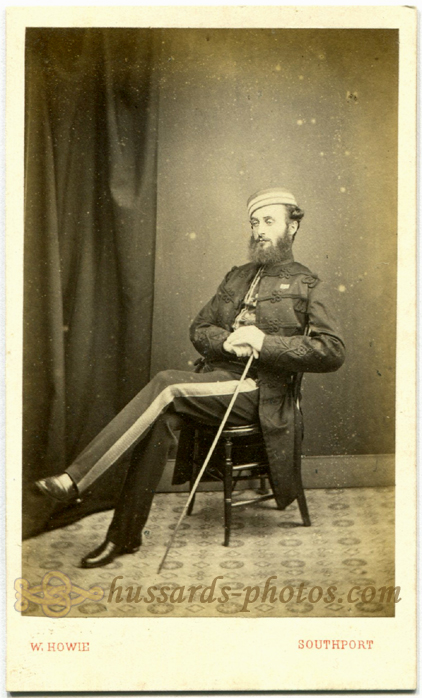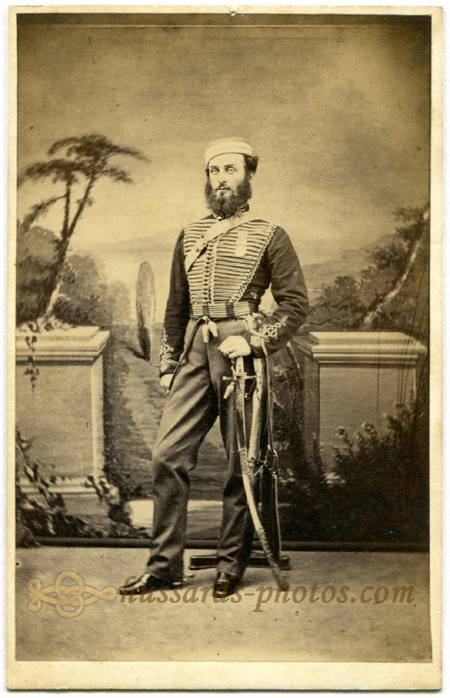|
First Part - William
Standish Carr Standish, 7th Light Dragoons.
William Standish Carr Standish was born on
the 28th February 1835, the eldest son of William Standish Carr,
of Cocken, in the county of Durham, and Susan Jenkins.
On May 6th 1841, his father was granted Royal Licence to change
his name to William Standish Srandish, "in compliance with
a proviso and direction contained in the last will and testament
of his cousin, Frank Hall Standish, late of Duxburry-hall, in the
county palatine of Lancaster, Esq. deceased".
William Standish Carr Standish was
gazetted in the Regular Cavalry on 19th August 1853 :
"7th Regiment of Light Dragoons, William
Standish Carr Standish, Gent., to be Cornet, by purchase, vice De
Veulle, whose retirement was announced in the Gazette of the 15th
July 1853."
He was still quite young when his father
died in 1856 :
"W.S. Standish, Esq.- July 10th, at Cocken
Hall, Durham, aged 48, William Standish Standish, Esq. - The
deceased, who was a magistrate for Durham and Lancashire, and a
deputy-lieutenant fot the latter county, was universally respected
by men of all classes in the north of England, and his amiable,
benevolent, and hospitable character had endeared him to a large
circle of friends, by whom his loss will be truly and deeply
regretted".
W.S.C.Standish was promoted very soon
afterwards :
"7th Light Dragoons, Cornet W.S. Carr
Standish to be Lieutenant, by purchase, vice Aytoun, promoted.
Dated 22nd July, 1856."
As a proper Cavalry Officer, he took part
in some races, as testified by the Times on Monday, March 23rd,
1857 :
"SPORTING INTELLIGENCE
THE GRAND MILITARY AND PYTCHLEY HUNT STEEPLECHASES.
FRIDAY.
SWEEPSTAKES OF 10 sovs. each, h. ft., with 100 added from the fund,
and 50 by the town of Northampton, for horses the property of
officers on full pay in the army. 12st. each. Certain winners
extra. The second to save his stake and receive 20 sovs. about
three miles. 17 subs.
Lieutenant Blundell's (Rifle Brigade) Horniblow, by Protestant,
12st. (owner)...............1
Lieutenant Coates's (7th Hussars) Massa Mungo, 12st. (Captain
Severn).......................2
Captain F. Morga's (Rifle Brigade) Veluti, 12st. 5lb. (including
5lb. extra), (owner)....3
Mr. G. Craven's (1st Life Guards) Xanthus, 12st. (Mr Wilkins).
Captain Baker's (12th Lancers) Aquamarine, 12st. (Captain Barker).
Lieutenant Carr Standish's (7th Hussars) Gentle, 12 st. (Owner).
Lieutenant Handley's (Scots Greys) Beware, 12st. 5lb. (including
5lb. extra). (Captain Townley).
Viscount Talon's (Chasseurs Afrique) Windsor, 12st. (Owner).
Major Brown's (4th Light Dragoons) Larry, 12st. (Captain Ellis).
Lieutenant Anderson's (King's Dragoon Guards) -, 12st. (Owner).
Major Jenning's (19th Regiment) King Dan, 12st. (Captain Barclay).
Lieutenant Hunt's (4th Light Dragoons) Sultan, 12st. (Owner).
Lieutenant Hay's (5th Dragoon Guards) Taffy, 12st. (Sir William
Gordon).
Betting.- 5 to 1 each agst Veluti and Xanthus, 6 to 1 each agst
Massa Mungo and Aquamarine, 7 to 1 agst King Dan, 8 to 1 agst
Horniblow.
Won by two lengths, a neck between the second and third ; sultan
was a bad fourth; Xanthus, Gentle, and King Dan straggled at wide
intervals. Windsor, while lying in a forward position, overjumped
himself at the brook the last time and came down. Taffy fell at
the last fence but one and broke his back."
Some sterner activities awaited :
the 7th Hussars were despatched to India a few month later when
the Mutiny broke out, boarding the clipper ship Lightning on
August 27th.
They landed at Madras (25 officers, 51 non-commissioned officers
and men, on November 5th and 28th) and were directed to Alahabad,
were horses were to be procured to them in December.
They were part of the brigade under Col.
Campbell of the Bays (along with the 79th Highlanders and Major
Anderson's troop of Horse Artillery), crossing into Oude on
January 4th. The objective of the British Army was to relieve
Lucknow, which was eventually achieved by March 16th.
Some troops were then used to garrison
Lucknow, but the 7th Hussars were then attached to the General
Walpole's Out Field Force - the Cavalry of which was commanded by
Brigadier Hagart.
The 7th Hussars then campaigned in Rohilcund, suffering badly from
the heat :
"Thus following his unsubstantial foe,
General Grant marched down as far as the Ganges, which he touched
at Doondiakera, near the point where tha Cawnpore boat was fired
on and captured by the Nana's peopla. Already the heat had begun
to tell upon th emen and officers, though they had been making
short marches, and there the 7th Hussars buried Captain Pedder.
From this point the column doubled back to Nugger, which it had
recently passed, on learning that some rebel Zemindars, together
with a chief named Ram Buksh, had taken up a position in its
neighbourhood. Reaching Nugger at 6 in the morning, the troops
rested till 3 in the afternoon, and then turned out for an attack
on the enemy's position. Before they had moved half a mile numbers
were sent back to camp, knocked up by the sun. An unsatisfactory
skirmish followed. Little loss was inflicted on the enemy, who
were very strongly posted about the village and fort of Simree,
and but two old guns had been secured when night fell. On their
side the rebels did us little harm, beyond carrying off a few
camels in an attempt upon our rear, and cutting off the head of a
poor sergeant in th eRifles lying sick in a dhooly. But the sun
did their work terribly well. Of the 38th Foot the enemy struck
but two men, and them but slightly, while the sun killed no fewer
than 15. On the 13th (Nota : May) the 7th Hussars buried seven,
and had been losing two, three, and four men daily since they left
Lucknow."
Bareilly was taken on May 7th, and on
June 4th 1858, the Times' correspondant could write :
"With the capture of Bareilly the last
great stronghold of the mutineers and rebels, the labours of the
Commander-in-Chief of India have for the present come to an
end."
The operations would actually linger on for months, but that's the
very day when Standish resigned his commission :
"7th Light Dragoons, Cornet the Honourable
C.Craven Molyneux to be Lieutenant, by purchase, vice Standish,
who retires. Dated 4th June, 1858."
It is quite strange that Standish should
have resigned his commission while his regiment was on active duty,
and there certainly is some potent reason behind that fact - it is
quite possible that he was a victim of the heat himself, as will
be hinted later.
He came back to England on board the
screw steamship Indomitable, reaching Gravesend on October 9th.
It is to be noted that Standish had boarded the before officialy
resigning :
"The screw steamship Indomitable, Captain
Kitt, arrived at Gravesend on Friday night from Calcutta with a
large party of sick and wounded troops, chiefly from Lucknow and
Delhi, on board. Her dates are, Calcutta, May 23 ; Sandheads, May
28 ; and St.Helena, August 25, the passage from Calcutta to
Gravesend being a very tedious one of 138 days, caused chiefly by
calms and adverse winds. The invalids, to the number of 2
sergeants and 98 rank and file,belonging to the (...), with 2
women and 5 children, reached Calcutta, and embarked on the 18th
of May, under the command of Captain H.H.Moseley, 42d Highlanders,
and Lieutenant G.Taylor, 53d Regiment, and in medical charge of
Dr.Brown. The following officers came home as passengers-viz.,
Lieutenant W.S.C.Standish, formerly of the 7th Hussars (...).
During the voyage a great deal of sickness prevailed on board, and
one officer, Lieutenant G.Haynes, 7th Hussars, who was invalided
home, and 14 men died. (...)"
He was awarded the Indian Mutiny Campaign
Medal with "Lucknow" Clasp - the medal he is proudly
displaying on this CDV.
|



